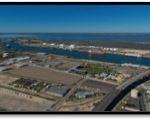 Corpus Christi, TX – The Port of Corpus Christi has diversified the commodities coming into and leaving the port. These efforts have paid off with increased volume. To better service customers and handle larger volumes the Port received a $10 million TIGER 2012 grant to begin Phase I of the Nueces River Rail Yard. In addition, BNSF, CCPN, Kansas City Southern and Union Pacific, the railroads served by the Port are contributing $4.125 million and the Port itself is investing $3.725 million. Phase I will be a 7,800-foot siding and four 4,000-foot tracks. Phase II is funded by a $22 million grant from the State of Texas as well as an additional $6 million from the Port. Phase II will expand the yard to eight, 8,000-foot tracks. This project will support M&G Polymer’s new plastic manufacturing plant; increasing demand from the growth of exports at the Bulk Terminal; grain handling at ADM’s export elevator; the import/export surge caused by the Eagle Ford Shale activity; military equipment returning from Iraq and Afghanistan; and the increased movement of wind energy components through the Port.
Corpus Christi, TX – The Port of Corpus Christi has diversified the commodities coming into and leaving the port. These efforts have paid off with increased volume. To better service customers and handle larger volumes the Port received a $10 million TIGER 2012 grant to begin Phase I of the Nueces River Rail Yard. In addition, BNSF, CCPN, Kansas City Southern and Union Pacific, the railroads served by the Port are contributing $4.125 million and the Port itself is investing $3.725 million. Phase I will be a 7,800-foot siding and four 4,000-foot tracks. Phase II is funded by a $22 million grant from the State of Texas as well as an additional $6 million from the Port. Phase II will expand the yard to eight, 8,000-foot tracks. This project will support M&G Polymer’s new plastic manufacturing plant; increasing demand from the growth of exports at the Bulk Terminal; grain handling at ADM’s export elevator; the import/export surge caused by the Eagle Ford Shale activity; military equipment returning from Iraq and Afghanistan; and the increased movement of wind energy components through the Port.
Access to three Class I railroads (BNSF, Union Pacific, and Kansas City Southern) was a key consideration in the design of the new yard. Rail capacity will increase from 30,000 to 70,000 rail cars per year and the project is expected to create 60 new construction jobs along with 40 additional jobs when the expansion is complete. M&G Polymers will be shipping 15,000 to 20,000 outbound rail cars of PTA and PET. Rail is crucial in sourcing coal from Colo., Utah, Mont. and Wyo. to be exported worldwide by ship from the bulk facilities. Grain sourced from Minn., Iowa, Mont., S.D., and Ill. is railed to the Port and exported worldwide. The Port of Corpus Christi is home to one of the largest grain facilities of the Gulf Coast ports; an efficient exporter of soybeans, wheat; and up to three 110-car trains per day.
 Also, the Port of Corpus Christi plays an important role in the development of South Texas’ Eagle Ford Shale oil and gas resources as a logistics and distribution center for cargo used for drilling, frack sand, barite and drilling pipe for the region. Since 2006, all major wind energy manufacturers have moved cargo through the Port. Wind cargo from an array of countries has made its way to wind farms via rail and truck. 2012 was a record year.
Also, the Port of Corpus Christi plays an important role in the development of South Texas’ Eagle Ford Shale oil and gas resources as a logistics and distribution center for cargo used for drilling, frack sand, barite and drilling pipe for the region. Since 2006, all major wind energy manufacturers have moved cargo through the Port. Wind cargo from an array of countries has made its way to wind farms via rail and truck. 2012 was a record year.
Additionally the Port of Corpus Christi earned its Military Strategic Port Designation in 1997 and plays an important role in the deployment of military equipment. Rail connectivity and infrastructure must be sufficient to accommodate the timely surge of military cargo set forth by military logisticians.


